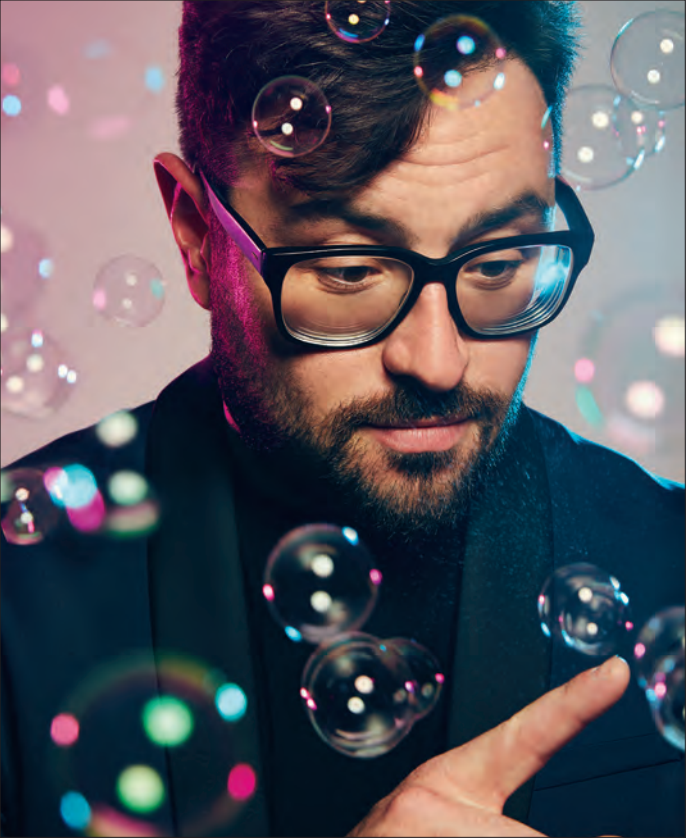My Page: Eliot Glazer’s True Tales of “Haunting Renditions”

It’s well known that a lot of comedians want to be musicians, and a lot of musicians want to be comedians. That’s why you see people like John Mayer, Erykah Badu and Michael Bublé dipping their toes into comedic waters. I hatched the idea for “Haunting Renditions” with Seth Keim, who’s a producer for Jimmy Fallon and has been my friend since high school. I wanted to do something in the realm of musical comedy because I’d done stand-up, storytelling and improv, but I’m also really into music and initially went to school on an opera scholarship. But I didn’t know how to infuse that into my comedy—all these musical comedy shows kept falling into the same realm, which was a ukulele, piano or guitar, and then silly lyrics that were double entendres.
We started the show as a Web series passion project where we were basically doing an Austin City Limits or MTV Unplugged parody with really lowbrow songs. Though it was never the goal, we got a little bit of traction, so I decided to try it out live. We collected a bunch of musicians and came up with the format of the show two-and-a-half years ago at Union Hall in Brooklyn, before moving to Littlefield and The Bell House. I live in L.A. now, so we’ll also do it at The Echo or at festivals throughout the year.
I was in an a cappella group in college, which has more bearing on “Haunting Renditions” than anything else, especially considering that my pianist and bandleader was the musical director of our a cappella troupe. That’s where the aesthetic for the show comes from—our friendship and our history doing a cappella. I was always trying to inject levels of humor into the show that didn’t really work for a college a cappella group but, at the very least, pushed the limits of what we performed and how we performed a little bit more. We’ve had a cross-section of guests. I’ve done duets with Ed Droste from Grizzly Bear and the drag queen Milk, who was on RuPaul’s Drag Race. We’ve had Abbi Jacobson re-emerge as her alter ego Val from Broad City to sing, and I even did “The 12 Days of Christmas” based on 2016 with Gilbert Gottfried. It’s wacky and strange, but it gives someone like Ed—who you’d think is a real quiet, thoughtful, wallflower type—a chance to tickle the funny bone. He’s actually really outgoing and fun. And it’s fun for me because it’s a chance to live out my other dream of being a musician and sort of play both roles.
I like to think that it toes the line between stand-up and absurdity. My favorite takeaway from the show is when people tell me that they were confused—that they weren’t sure how to respond. Someone might say, “You made me tear up while you were singing Katy Perry,” and I love that. It’s such a great form of comedy because it falls somewhere between parody, absurdism, fandom and a regular, straight-up concert. Reggie Watts once explained the term “disinformation” to me, and that informs a lot of his act. It’s an intellectual, philosophical practice where you’re filling the ether with content that isn’t actually content, and this is an outpouring of that idea. It makes the audience listen a little closer. For me, that’s such an elevated way of performing. We tend to do a lot of ‘90s songs and laugh at how they had this air of self-seriousness that had a big hold on culture at that time. People in their 20s to 40s are really obsessed with nostalgia, even if it’s very recent history. When I was a teenager in the ‘90s, music had such a visceral effect on our life and was an integral part of your personality. Whether you were a slacker, slinger or any of those cultural niches that were so focused on identity, music helped identify who you were—grunge, the idea of sellouts and this reimagining of pop stars. That’s what makes those ‘90s songs so easy to lampoon—we are poking fun at ourselves and who we were, not just waxing nostalgic.
I personally fell into that momentary jamband phase— Dave Matthews Band, Guster, Sublime, even Barenaked Ladies. We recently added “Ants Marching” to our set—it is just so self-aggrandizing. The lyrics are kitschy spiritual, and once you actually stop and listen to the lyrics, you remember how Dave Matthews Band, Phish, Hootie & The Blowfish and Guster really gave Caucasian guys a chance to act like they were deep. It’s funny to look back on these moments. I went to Lilith Fair when I was 16 and I loved every minute of it, but it was so self-congratulatory and straight-up goofy to be so taken with yourself—to be taken with how deep you thought you were.
In the ‘90s, music gave people a chance to form an identity based around their tastes. When I was growing up, stores at the mall would sell specific merchandise based on Korn or Limp Bizkit that let you identify as a pissed-off teenager, raging against the machine. It was so potent, and I don’t think that’s true of teenagers anymore. So it’s very easy to lambaste because, when you become an adult, you realize that you don’t want to be defined by the fact that you listen to Rusted Root. You want to be defined by more than that.
Eliot Glazer is an executive story editor on New Girl, has written for Younger and recently developed an original half-hour comedy produced by Will Arnett for Comedy Central. He can be seen in a recurring role on Broad City, where he also serves as a creative consultant.



















